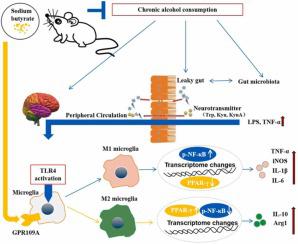Background
Alcohol abuse triggers neuroinflammation, leading to neuronal damage and further memory and cognitive impairment. Few satisfactory advances have been made in the management of alcoholic central nervous impairment. Therefore, novel and more practical treatment options are urgently needed. Butyrate, a crucial metabolite of short-chain fatty acids (SCFAs), has been increasingly demonstrated to protect against numerous metabolic diseases. However, the impact of butyrate on chronic alcohol consumption-induced central nervous system (CNS) lesions remains unknown.
Methods
In this study, we assessed the possible effects and underlying mechanisms of butyrate on the attenuation of alcohol-induced CNS injury in mice. Firstly, sixty female C57BL/6 J mice were randomly divided into 4 groups: pair-fed (PF) group (PF/CON), alcohol-fed (AF) group (AF/CON), PF with sodium butyrate (NaB) group (PF/NaB) and AF with NaB group (AF/NaB). Each group was fed a modified Lieber-DeCarli liquid diet with or without alcohol. After six weeks of feeding, the mice were euthanized and the associated indicators were investigated.
Results
As indicated by the behavioral tests and brain morphology, dietary NaB administration significantly ameliorated aberrant behaviors, including locomotor hypoactivity, anxiety disorder, depressive behavior, impaired learning, spatial recognition memory, and effectively reduced chronic alcoholic central nervous system damage. To further understand the underlying mechanisms, microglia-mediated inflammation and the associated M1/M2 polarization were measured separately. Firstly, pro-inflammatory TNF-α, IL-1β, and IL-6 in brain and peripheral blood circulation were decreased, but IL-10 were increased in the AF/NaB group compared with the AF/CON group. Consistently, the abnormal proportions of activated and resting microglial cells in the hippocampus and cortex regions after excessive alcohol consumption were significantly reduced with NaB treatment. Moreover, the rectification of microglia polarization (M1/M2) imbalance was found after NaB administration via binding GPR109A, up-regulating the expression of PPAR-γ and down-regulating TLR4/NF-κB activation. In addition to the direct suppression of neuroinflammation, intriguingly, dietary NaB intervention remarkably increased the levels of intestinal tight junction protein occludin and gut morphological barrier, attenuated the levels of serum lipopolysaccharide (LPS) and dysbiosis of gut microbiota, suggesting that NaB supplementation effectively improved the integrity and permeability of gut microecology. Finally, the neurotransmitters including differential Tryptophan (Trp) and Kynurenine (Kyn) were found with dietary NaB administration, which showed significantly altered and closely correlated with the gut microbiota composition, demonstrating the complex interactions in the microbiome-gut-brain axis involved in the efficacy of dietary NaB therapy for alcoholic CNS lesions.
Conclusion
Dietary microbial metabolite butyrate supplementation ameliorates chronic alcoholic central nervous damage and improves related memory and cognitive functions through suppressing microglia-mediated neuroinflammation by GPR109A/PPAR-γ/TLR4-NF-κB signaling pathway and modulating microbiota−gut−brain axis.

































 京公网安备 11010802027423号
京公网安备 11010802027423号